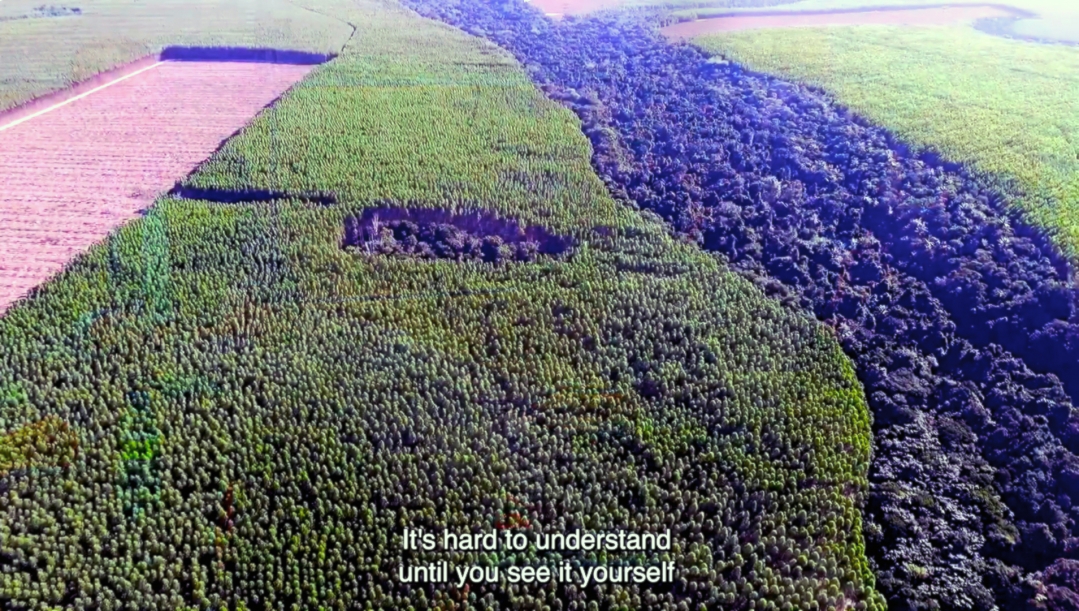

Eucalyptus plantations, often called "green deserts," appear lush but lack biodiversity, and devastate local ecosystems. They deplete water sources, inhibit native plant growth, and support few animal species, creating barren environments. In Brazil, where eucalyptus covers 7.6 million hectares, the consequences are severe. Native forests once provided food, medicine, and clean water, but eucalyptus plantations offer none of these benefits. In states like Bahía and Espírito Santo, vast areas of the Mata Atlantica (Atlantic Forest) have been replaced by monocultures, leaving local communities with fewer resources. Corporations like Suzano export eucalyptus for products like toilet paper, amassing huge profits from this destructive cycle. -----
Drone footage courtesy of FASE from the documentary video Brazil's Eucalyptus Invasion (please see Video/Multimedia link bottom left)
Brazil’s Green Deserts and the Eucalyptus Invasion
Orin Langelle | Espiritó Santo, Bahía, Mato Grosso do Sul, Brazil
Organization: Langelle Photography
Photographer: Orin Langelle
Organization: Langelle Photography
Exhibit Title: Brazil’s Green Deserts and the Eucalyptus Invasion
Location: Espiritó Santo, Bahía, Mato Grosso do Sul, Brazil
This exhibit, "Brazil’s Green Deserts and Eucalyptus Invasion," documents Indigenous Peoples, Quilombola communities and social movements in Brazil struggling to reclaim their lands from industrial eucalyptus plantations.
The photos were taken in 2023 in the states of Espiritó Santo, Bahía and Mato Grosso do Sul during an investigative delegation by Global Justice Ecology Project, which spoke with communities both resisting and impacted by the pulp industry and plantations.
Brazilian eucalyptus plantations are called “green deserts” due to their destructive impacts, including depletion of water and soils, destruction of native forests, chemical contamination of water and forced displacement of communities.
In Brazil, eucalyptus plantations, cover millions of hectares. They are expanding due to a sharp rise in global demand for pulp. And Brazil recently legalized use of genetically engineered eucalyptus trees modified to grow faster, tolerate toxic herbicide spraying and kill insects. This will exacerbate the already serious problems of eucalyptus plantations.
This essay documents the determination and resistance of communities at risk, including Quilombolas, Indigenous Ofayé, and the Landless Workers’ Movement (MST), highlighting their struggles for land and sovereignty.
Press Express, LLC
Independent Media Institute. New York
Margaret Prescod, KPFK Pacifica Radio, Los Angeles
Special thanks to:
Quilombola Angelim II Community
Quilombola Miúda Community
The Ofayé People
MST Indio Galdino Santos Community (Landless Workers Movement, Movimento dos Trabalhadores Rurais Sem Terra (MST)
MST Agroecology School
Ceres Trust
And:
Anne Petermann
David Hathaway
Beto
Clara Junger
Jose María
Lucy Sharratt
Marina Wright
In May and June 2023, I traveled to Brazil as a photographer, alongside videographer Steve Taylor, as part of an investigative delegation organized by Global Justice Ecology Project. Our mission was to document the vast monoculture eucalyptus plantations that consume millions of hectares of land across the country, and their impacts on local communities. These plantations are known locally as “green deserts” due to their devastating depletion of water and biodiversity, stretch endlessly across the landscape.
This photo essay is a visual reflection of our findings, a documentation of the environmental and social destruction caused by these plantations. My work focuses on the communities and the people whose lives are impacted.
The delegation started in the states of Espirító Santo and Bahía, long impacted by the plantations, then went to Brasilia, the capital city, to present the demands collected from the people we met with. We also went there to educate lawmakers on the threat posed by plans for genetically engineered tree plantations. From there we went to Mato Grosso do Sul, the state where eucalyptus plantations are rapidly replacing native cerrado forests, and where the world’s largest pulp mills are presently and soon to be under construction.
Steve Taylor’s thirty-minute documentary, "Brazil’s Eucalyptus Invasion," provides a narrative through video and interviews with impacted local communities and the visit to Brasilia. (To view: please ses Visual/Multimedia, lower left hand corner.)
My photographs aim to capture the resilience of those fighting back: Indigenous Peoples, Quilombola communities, and members of the Landless Workers’ Movement (MST) who are working to protect their land, their cultures, and their future. Through my lens, I highlight the strength and determination of these communities, whose struggles often go unnoticed by the wider world.
The story of eucalyptus plantations in Brazil is a story of land grabs, corporate greed, environmental degradation, and the battle for justice. Brazil is the world’s largest producer of eucalyptus. Suzano is the world’s largest pulp company, profiting from the endless eucalyptus plantations driving the destruction of both land and life. By sharing these images, I hope to bring attention to the urgent need to reconsider industrial forestry practices and to recognize the people on the frontlines of this fight.
This work is not just a documentation of environmental and social damage—it is a call to action. Behind every plantation is a community fighting for their future. Behind every image, there is a story of resilience and resistance. These photographs aim to amplify those stories and bring the fight for land and justice to a wider audience.
Global Justice Ecology Project (International - Desks in US, Canada, Mexico)
Campaign to STOP Genetically Engireed Tree (International)
World Rainforest Movement (International)
FASE - Federação de Órgãos para Assistência Social e Educacional, (Brazil)
CBAN - Canadian Biotechnology Action Netwok
ECO-NEXUS (UK)
GE Free New Zealand
Save our Seeds (Japan)
Orin Langelle
Langelle Photography
POB 124
Randolph, NY 14772
+1 716 536 5669
orrinl@globaljusticeecology.org
Make Comment/View Comments